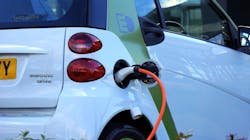Battery Prices Decrease, EV Prices Remain High
April 29, 2022—Interest has increased for electric vehicles, especially over the course of the past few months thanks to steep gas prices and new EV models.
Amidst all of this, according to The Grist, the price of batteries is getting less expensive but the price of electric vehicles is increasing.
Lithium-ion battery cost has gone down drastically over the last decade. In 2011, it would cost $946 per kilowatt-hour. In 2021, it cost $132.
The Grist cites data from Cox Automotive, and it reveals that the average price of an EV as of December 2021 was $63,821. In 2015, an EV cost an average of $35,880, which was only slightly larger than the overall industry average at the time of $33,543.
This data is even more stark when considering that the average cost of an internal combustion engine vehicle in December 2021 averaged at $47,000. So why are EVs getting and staying more expensive in comparison?
Unsurprisingly, much of this has to do with supply chain issues. Even given the lower battery price, there is still a high enough demand for EVs that production cannot and is not able to keep up.
The data shows that there is still a long way to go before EVs generally cost around the same as an ICE vehicle. In 2014, there was about an $8,000 difference between the two. Today, EVs are averaging at an increased expense of $22,000 when compared with an ICE option.
As more EV models are introduced, bigger batteries are getting put into the vehicles. This ultimately increases price as well.
High gas prices will also continue to be a cause for increased demand, but with so many other factors at play it appears that EV sticker prices are still going to remain high.
About the Author
NOLN Staff Reporters
The NOLN staff reporters cover the quick maintenance industry every day, from top to bottom. For news inquiries, please contact [email protected].
